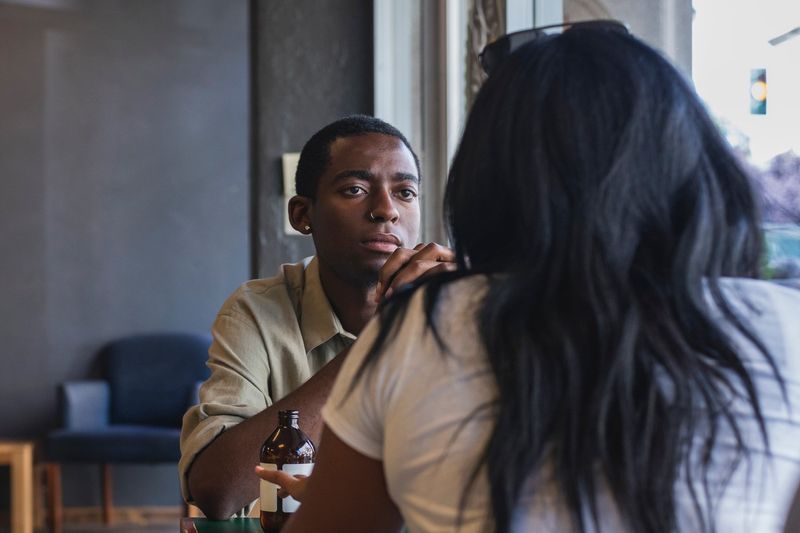17 Red Flags You’re In A One-Sided Friendship
Friendship is a mutual bond where both parties offer and receive support, joy, and companionship. However, sometimes these relationships become unbalanced, with one person giving more than they receive.
A one-sided friendship often leaves one party feeling undervalued and emotionally exhausted. Recognizing the signs of such an imbalance early can save you emotional stress and allow you to seek healthier connections.
In this post, we will explore 17 distinct red flags that might indicate you’re in a one-sided friendship. Each point highlights a unique aspect of imbalance, helping you to reflect on your friendships and make informed decisions about where to invest your time and energy.
1. You’re Always the One Making Plans—and Adjusting Them

If you find yourself constantly being the one to make plans, and then having to adjust them to accommodate your friend’s schedule, it signals a lack of mutual consideration. This pattern can leave you feeling like your time and commitments are less important.
A balanced friendship involves both parties making efforts to meet each other halfway. When one person is perpetually rearranging their life to fit another’s, it reflects an inequity in how each person values the other’s time.
It can lead to frustration and resentment, especially if your friend doesn’t show the same willingness to compromise or prioritize time together. Over time, this dynamic can wear you out emotionally and make you question the true nature of the friendship.
2. They Dominate Conversations but Rarely Ask About Your Life

In a healthy friendship, conversation flows both ways, with each person showing interest in the other’s life. However, when one friend consistently dominates discussions and rarely inquires about what’s happening with you, it’s a red flag.
This behavior can make you feel invisible and undervalued, as if your experiences and feelings are secondary. Over time, this imbalance can lead to emotional fatigue and a sense of alienation. It might seem like your friend is more interested in having an audience than an actual reciprocal relationship.
This one-sided communication can erode your sense of connection and make you feel more like a sounding board than a valued friend.
3. You Feel Emotionally Drained After Every Interaction

Feeling emotionally drained after spending time with a friend is a significant red flag. If interactions consistently leave you feeling tired rather than uplifted, it’s an indication that the friendship may be one-sided.
This emotional exhaustion often stems from continuously giving support and energy without receiving the same in return. Over time, it can lead to burnout and a sense of depletion. Healthy friendships should rejuvenate and energize you, not exhaust you.
When you repeatedly find yourself emotionally spent after interactions, it suggests an imbalance that could be detrimental to your well-being.
4. They’re Available When They Need Something—but Disappear Otherwise

A friend who is only present when they need something from you but is otherwise unavailable is a classic sign of a one-sided friendship.
This behavior can make you feel used and unimportant. It reflects a pattern where your friend’s convenience takes priority over a genuine reciprocal relationship. Over time, this kind of interaction can lead to feelings of resentment and hurt.
You might start questioning the authenticity of the friendship and your friend’s true intentions. A balanced friendship involves being there for each other through both good times and challenging ones, not just when it’s convenient for one party.
5. They Brush Off Your Problems but Expect You to Drop Everything for Theirs

A friendship where your problems are minimized while theirs demand immediate attention signals a lack of empathy and mutual respect.
This behavior can make you feel disregarded and undervalued. It’s important for friends to offer support and understanding, not just expect it for themselves. When your issues are brushed aside, it creates an emotional imbalance where your feelings and experiences are seen as less important.
This dynamic fosters resentment and can lead to a gradual erosion of trust. In a healthy friendship, both parties should feel heard and valued, rather than experiencing a one-sided demand for support.
6. You Censor Your Good News to Avoid Making Them Uncomfortable

Censoring your good news to avoid making a friend uncomfortable is a subtle but telling sign of an unequal friendship.
It implies that your friend might not genuinely celebrate your successes, leading you to downplay achievements to maintain peace. This behavior can stifle your joy and create a dynamic where your happiness is secondary to their comfort.
Over time, it can make you feel as though your accomplishments are less meaningful or worth sharing. A healthy friendship should be a space where you can freely share your joys without fear of causing discomfort or jealousy.
7. Support Feels Transactional—not Genuine

When support in a friendship feels transactional, it lacks the genuine care and spontaneity that characterize true bonds.
This dynamic is marked by a sense that every favor or act of kindness comes with strings attached, creating an environment where you feel more like a business associate than a friend. Such relationships often leave you questioning the authenticity of the support you receive.
Over time, this can lead to emotional fatigue and a sense of skepticism about your friend’s intentions. A truly supportive friendship thrives on genuine concern and the joy of helping one another, without keeping score.
8. They Forget Big Events—or Show Up When It’s Convenient

A friend who frequently forgets important events or only participates when it’s convenient reveals a lack of commitment.
This behavior can make you feel undervalued and question the significance of the friendship. Remembering and celebrating milestones is a fundamental part of nurturing any relationship. When these moments are disregarded, it can lead to feelings of isolation and disappointment.
Such patterns indicate that your friend’s priorities might not align with maintaining a meaningful connection. A balanced friendship involves mutual effort in recognizing and valuing each other’s important life moments.
9. When You Pull Back, They Barely Notice

If you find that pulling back from a friendship goes unnoticed, it’s a clear indication of a one-sided dynamic. This lack of awareness or concern can make you feel invisible and unimportant.
A healthy friendship should involve mutual investment, where both parties notice and respond to changes in the relationship. When your absence or reduced effort is met with indifference, it suggests that the friendship might not hold the same value for your friend as it does for you.
Over time, this imbalance can lead to feelings of loneliness and the realization that the friendship might not be as reciprocal as you hoped.
10. You Second-Guess Your Value After Spending Time with Them

Feeling the need to second-guess your value after spending time with a friend is a significant red flag. In a balanced friendship, interactions should leave you feeling supported and valued, not uncertain about your worth.
When a friendship consistently causes you to question your self-esteem, it’s a sign of an emotional imbalance. This dynamic can lead to a cycle of self-doubt and anxiety over time, eroding your confidence and sense of self.
A healthy friendship should lift you up and affirm your value rather than making you feel lesser. Recognizing this pattern can be the first step toward seeking more uplifting and supportive connections.
11. Their Apologies (If Any) Are Defensive, Not Sincere

Apologies that come off as defensive rather than sincere indicate a lack of genuine accountability in a friendship.
This behavior can make you feel unheard and invalidated. Instead of acknowledging your feelings, a defensive apology shifts blame and minimizes the issue. This pattern can lead to resentment and a breakdown in communication.
Over time, it erodes trust and the foundation of mutual respect that friendships are built on. A sincere apology demonstrates empathy and a willingness to understand and address the harm caused. Without this, the friendship may struggle to withstand challenges and grow positively.
12. They Expect Patience but Offer None in Return

Expecting patience from you while offering none in return is a clear sign of an imbalanced friendship. This behavior reflects a lack of mutual respect and consideration.
A friendship should involve both parties understanding and accommodating each other’s needs and circumstances. When one person consistently expects leniency but fails to offer the same, it creates feelings of frustration and inequality.
Over time, this dynamic can lead to resentment and a sense of being taken for granted. For a friendship to thrive, both individuals need to be willing to give and receive understanding and patience equally.
13. They Make Subtle Digs at Your Boundaries

Subtle digs at your boundaries indicate a lack of respect and empathy in a friendship. These comments, often disguised as jokes or offhand remarks, can undermine your confidence and sense of safety.
Boundaries are essential in maintaining healthy relationships, and when they are not respected, it can lead to feelings of discomfort and vulnerability.
This behavior suggests that your friend might not fully appreciate or understand the importance of your personal limits. Over time, these subtle boundary violations can erode trust and make you question the friendship’s foundation. A balanced friendship involves mutual respect and understanding of each other’s boundaries.
14. You’re Walking on Eggshells Just to Keep the Peace

Walking on eggshells around a friend to maintain peace is a significant red flag. This behavior indicates that the friendship lacks open and honest communication.
When you feel the need to constantly monitor your words and actions to avoid conflict, it creates an environment of stress and anxiety. Over time, this can lead to emotional exhaustion and a sense of being trapped in a relationship where you cannot be your authentic self.
A healthy friendship should allow for open dialogue and the expression of true feelings without fear of repercussions. If you find yourself constantly tiptoeing around issues, it might be time to reassess the relationship’s dynamics.
15. You Notice Their Effort Goes to Others—but Rarely to You

Noticing that your friend invests more effort in others than in you is a telling sign of imbalance. This behavior can make you feel overlooked and undervalued.
Friendships thrive on mutual attention and care, and when this is directed more towards others, it can lead to feelings of neglect. Over time, this dynamic fosters resentment and questions about the importance of your friendship in their life.
A balanced relationship involves equal effort and consideration for each other’s needs. If a friend consistently prioritizes others, it may be time to evaluate the true nature of your connection.
16. You’re the Backup Plan, Not the First Call

Realizing you’re often the backup plan instead of the first choice is a clear indicator of a one-sided friendship. This dynamic can make you feel like an afterthought, rather than a valued part of your friend’s life.
Consistently being the last-minute option suggests that your friend might not prioritize your relationship as highly as you do. Over time, this feeling of being undervalued can lead to disappointment and a desire for a more reciprocal connection.
In a healthy friendship, both parties should feel like a priority and trust that they hold significant importance in each other’s lives.
17. You Feel Lonelier with Them Than Without Them

Feeling lonelier with a friend than when you are alone is a profound red flag in any relationship. This sensation suggests that the companionship you seek is not being fulfilled, and the friendship might be more of a burden than a source of joy.
Over time, this loneliness can lead to feelings of disconnection and sadness. In a healthy friendship, being together should enhance your sense of connection and belonging, not diminish it.
If you frequently feel isolated in their presence, it’s crucial to reflect on the friendship’s dynamics and whether it truly serves your emotional well-being.







